Protected areas for inclusive conservation and prosperity: a vision for the IUCN-WCPA

Protected and conserved areas
Protected and conserved areas (PCA) represent one of the primary and the most successful conservation strategies for maintaining biodiversity in the face of the extraordinary challenges induced by global changes.
PCAs are powerful instruments for the regeneration of Nature. They are the generators of the vital ecosystem services that ensure the continuity of human health, wellbeing, and prosperity, including our economic, cultural, and spiritual development. Today, around 15.1% of terrestrial and 10.2% of marine areas are legally protected (UNEP-WCMC, IUCN, and NGS, 2020). Still, despite the increasing global coverage of PCAs over the last decades, we have barely reached the goals that the international community set for 2020 (Aichi Target 11: 17% terrestrial and 10% marine), and we are still far from reaching the goals (45-50% terrestrial and at least 30% marine) that scientists have estimated would allow for reversing biodiversity loss and stabilizing Earth’s climate (MacKinnon et al., 2020; Dinerstein et al., 2020; Woodley et al., 2020). Furthermore, there are still many challenges to solve, especially those related to management effectiveness and interface with humanity in all its forms and activities, and maintain healthy relationships between people and Nature.
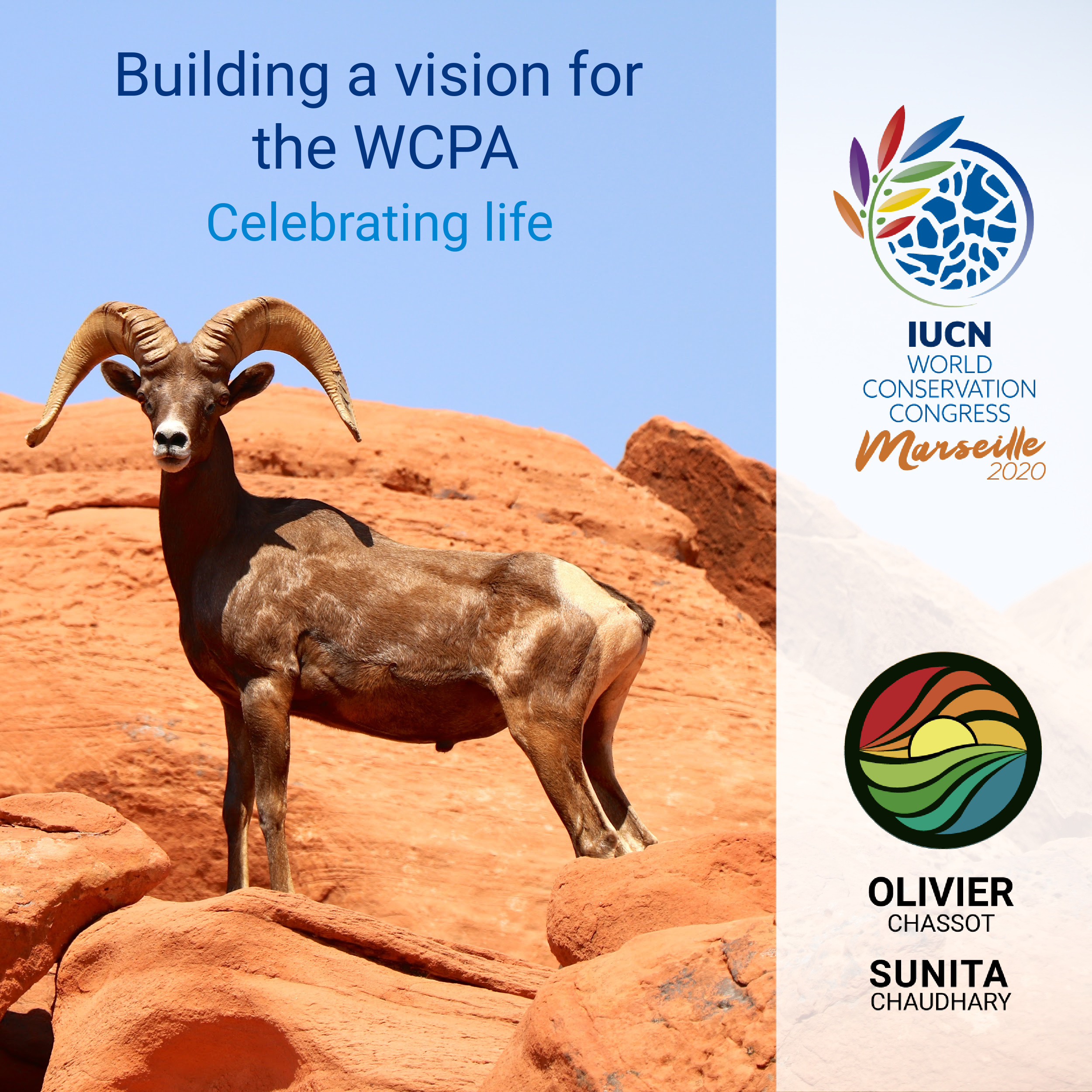
World Commission on Protected Areas
The IUCN World Commission on Protected Areas (WCPA) is the world’s premier network of protected areas experts with over 3,200 members across 140 countries. WCPA promotes PCAs as a catalyst for development benefits and works by helping governments, non-governmental organizations, and other stakeholders to plan PCA systems by providing strategic guidance and strengthening the capacity of PCAs for conservation and development. With multiple emerging challenges and threats to Nature and PCAs, WCPA requires an approach and vision to safeguard the natural assets and associated social and cultural values to generate a positive change.
Our journey
On our path to hopefully become the next Chair and Deputy Chair of the WCPA, we have developed a bold vision for the new decade (2020-2030) with an opportunity to strengthen WCPA to halt biodiversity loss and generate benefits for human wellbeing and prosperity. Our journey to WCPA candidacy has inspired us on the personal and professional levels. Our personal stories maybe relate to WCPA differently, but our ethics and passion for conservation and our different experiences and trajectory unite us firmly and motivate us to step forward to assume the highest leadership of the WCPA, and to work for a better world where we respect, love, and live in harmony with Nature:
Sunita Chaudhary (Nepal)
My love and respect for Nature have been strong since childhood as I was born and raised in a subtropical mountain forest area playing with monkeys, deer, rabbits, and snakes.
This bond became a profession when my specific interests in big fauna, such as the Royal Bengal tiger and Ganges River dolphin, inspired me to work for them, especially in protecting their habitats and safeguarding their populations. I took a step and decided to affiliate with conservation organizations advocating for Nature, and build a network with like-minded people and organisations. During this journey, I met Olivier, who shares the same passion and ethics for conservation and development for marginalized groups. Together, we decided to make a change to address issues of inequity and injustice impacting both Nature and development.
Olivier Chassot (Costa Rica)
Connecting people with Nature and allowing everyone to do so is the World's best option to nurture more positive feelings towards life and regenerate ourselves. I feel lucky always to have been in direct contact with Nature. My father used to take me hiking in the mountains or to the forest to collect mushrooms in Switzerland since I can remember. I have always been curious about Nature. As a child, I spent a lot of time exploring neighboring forests looking for birds and other creatures. When inside, I devoured books of all sorts, seeking information tirelessly about species and ecosystems that I knew I would one day see and explore by myself. Now that I live in Costa Rica and work in biodiversity conservation a bit everywhere in the World, this has become a reality and a key component of my life: I try to enjoy Nature almost all the time.
My unconditional love for Nature drives my every action, continuing to shape who I am every day.
My conservation career started with local research projects in Costa Rica, together with my wife: marine turtles and macaws. Our actions were inclusive, working with all government levels, academia, local communities, and everyone interested. This different approach allowed us to reach our conservation and development targets, and I also quickly realized that the impacts of my actions could scale up. Since I was a student, I always spent most of my time helping out others, volunteering in any meaningful capacity, and since I was a young professional, I also started mentoring students and contributing in a voluntary position. I started early joining national, regional, and global organizations where I found a wonderful and inspiring community of beautiful people from all walks of life. I was allowed to contribute at different leadership levels.
The WCPA represents that interacting with the best minds and bringing my experience from fieldwork to the international scene. This is about when I met Sunita, at an international workshop in Austria in 2013. I clearly remember how Sunita fascinated our audience with her recounts on transboundary landscape conservation and development initiatives in the Hindu Kush Himalayas. At 39, Sunita is a passionate young woman with high emotional intelligence and a profound inner peace that radiates and touches everyone. I have the intimate conviction that we complement each other perfectly and are in the best capacity to lead the WCPA.
Transformative change
To bring the WCPA to the next level, we advocate a necessary transformative change that focuses on equity and sustainability. These aspects are deeply integrated into our personal beliefs, our ways of life, and our professional ethics.
This is why we want to enhance the diversity of governance of PCAs, strengthen the meaningful participation and leadership of indigenous and local communities, park rangers, youth, women, under-represented groups, and reaffirm the value of PCAs for equitable conservation and development outcomes.
Our proposed vision for the WCPA will specifically concentrate on the following principles: inclusion and diversity, meaningful and active participation, collaboration and teamwork, human rights and social justice, decentralized management, accountability, sensitivity, adaptation, dialogue, and equal representation. The work and efforts in and around protected and conserved areas need to be strongly connected with territories' reality and their human component. The benefits of conservation and sustainable development success to local communities become more tangible.
Youth and young professionals
An essential component of the transformative change that we want to bring to the WCPA involves youth. Youth and young professionals are uniquely equipped to change our society. They are whistleblowers and lead societal transformation in many aspects, driven by values of equity, justice, and inclusion. They build different models to deliver solutions to the issues created by their elders. It will be our duty to integrate youth at all levels of the leadership of the WCPA, to encourage and empower youth to take an active part in the decision-making processes of the WCPA so that they may play a significant role in the implementation of the Commission's agenda. We feel that our society has not yet come to fully include youth in professional circles and their decision-making spaces, which is also true for the WCPA. We are committed to improving this situation. Our vision for the WCPA includes full openness for our members' active participation, with spaces to create, build, and share experiences. From our perspective, we will open spaces for participation with a vision of democratization that facilitates mechanisms so that the members know how to engage and can participate actively. We will seek that the WCPA membership has more active participation.
We will ensure that young professional members can have greater involvement in decision-making spaces and that they may also access leadership positions within the Commission.
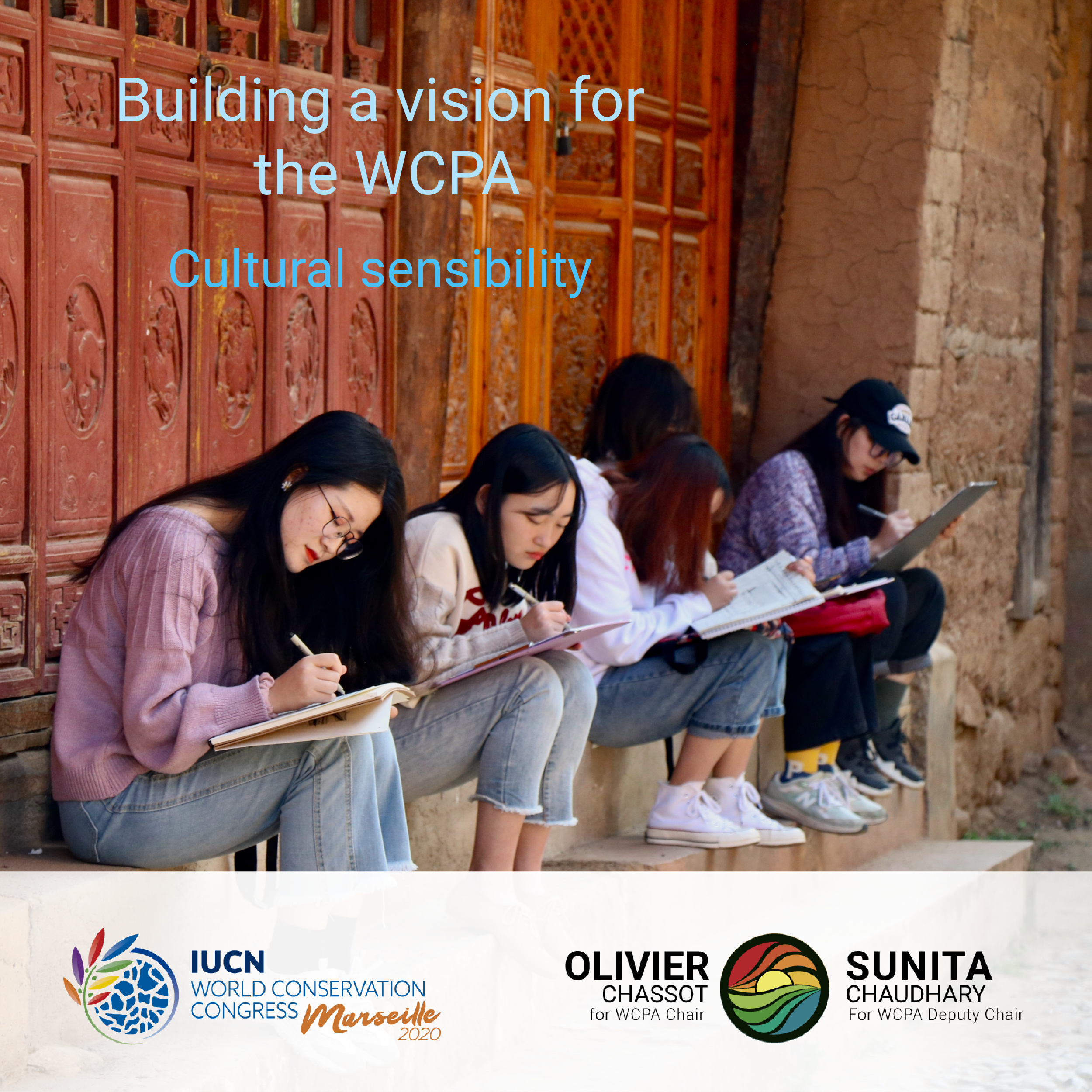
To make this change effective, we need the youth's help to activate the individual, the community, and governance systems at multiple scales to generate systems and cultures that are equitable and sustainable. We need your help in spreading the message about protected and conserved areas as the cornerstone of biodiversity conservation and ecosystem services for human prosperity. We want to invite the youth and all our WildHub community to join the IUCN commissions, especially the WCPA, to support our vision of protecting our biodiversity, ecosystems, and planet, by applying on the IUCN Commissions Portal.
We believe that youth and WildHub are agents of change that can make a difference by empowering people creatively and collaboratively with the necessary transformations to deliver a better world.
We face times of maximum uncertainty with dynamics such as climate change, pandemics, racism, misunderstandings, individualism, exclusions, and greed that take away our sleep, and thus we feel the urgent need to take decisive action with equity, dignity, compassion, and love. The youth is in the best position to contribute, and we feel optimistic about it. The future is our choice, and the way forward involves an unprecedented transformative change to implement solutions to global challenges, with benefits for everyone.
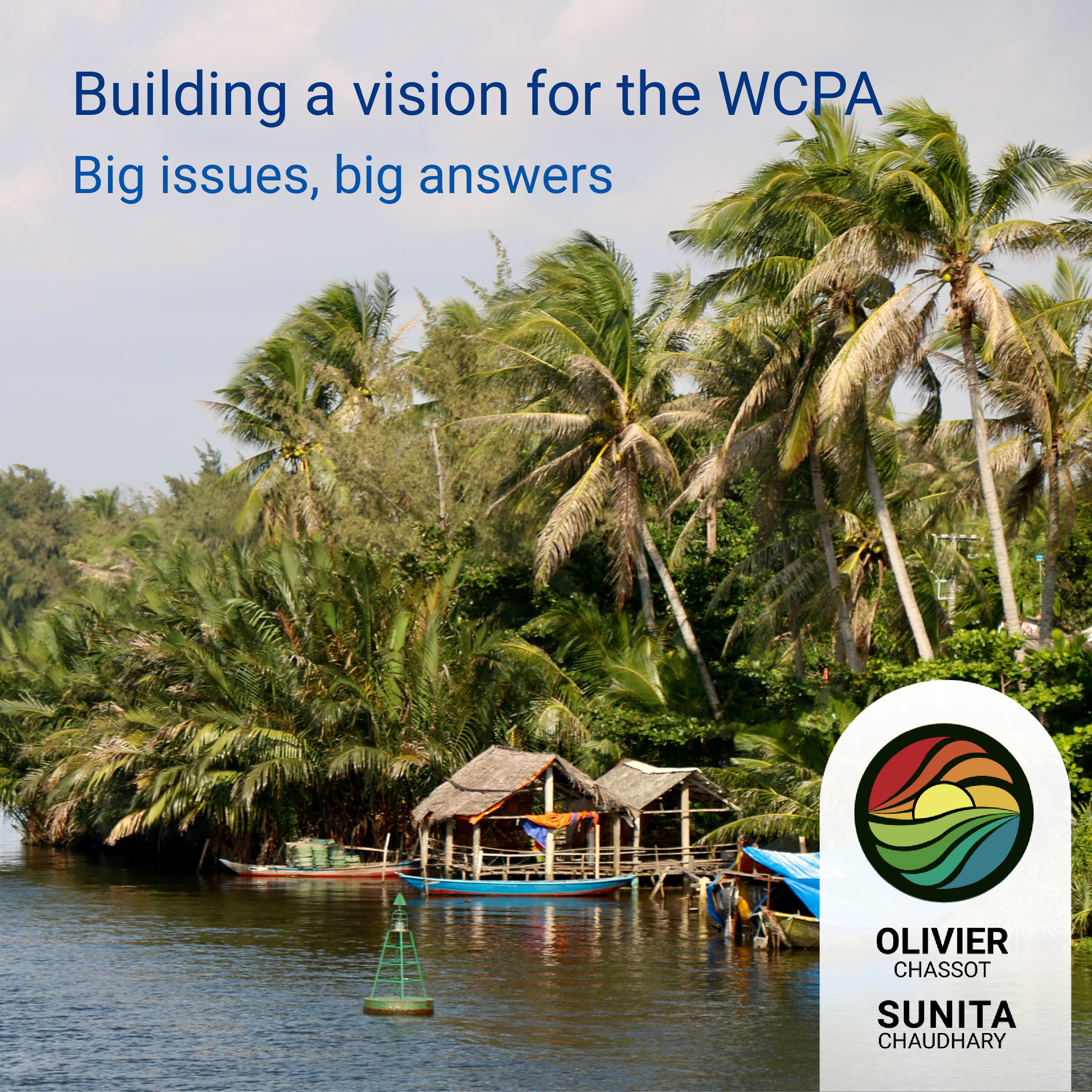
We request the community to support our vision for the WCPA, for a more inclusive and just world, for biodiversity, for people (including women, indigenous peoples, and youth), and a better world. For more information about our vision, please consider visiting and following us: Facebook, Blog, LinkedIn.
Dinerstein E., Joshi A. R., Vynne C., Lee A. T. L., Pharand-Deschênes F., França M., Fernando S., Birch T., Burkart K., Asner G. P., Olson D. (2020). A “Global Safety Net” to reverse biodiversity loss and stabilize Earth’s climate. Science Advances 6, 2020. DOI: 10.1126/sciadv.abb2824WWF (2020). Living Planet Report 2020 - Bending the curve of biodiversity loss. Almond R.E.A., Grooten M., Petersen T. (Eds). WWF, Gland, Switzerland. https://wwfin.awsassets.panda.org/downloads/lpr_2020_summary.pdf
UNEP-WCMC, IUCN, NGS (2020). Protected Planet Live Report 2020. UNEP-WCMC, IUCN and NGS: Cambridge UK: Gland, Switzerland; and Washington, D.C., USA. https://livereport.protectedplanet.net/
Woodley, S., Locke H., Laffoley D., MacKinnon K., Sandwith T., Smart J. (2019). A review of evidence for area-based conservation targets for the Post-2020 Global Biodiversity Network. PARKS 25: 31–46. https://doi.org/10.2305/IUCN.CH.2019.PARKS-25-2SW2.en


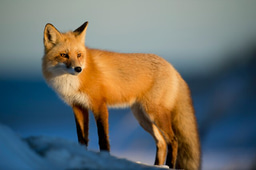
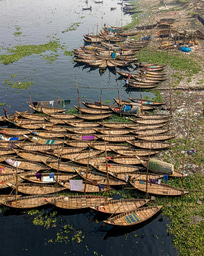
Please sign in or register for FREE
If you are a registered user on WildHub, please sign in
Great article!
The first step is certainly to preserve what we have!
Educate others and create jobs in the sector, whilst educating people about how they can reduce their effect and finally creating habitat and concentrating on regenerative agriculture and a circular economy.
I hope we can link up with you in some way.
Mike C
Excellent for a sustainable future
Thank you for sharing this Olivier and Sunita. I am interested to know how the WCPA is progressing, especially with the youth engagement programme!